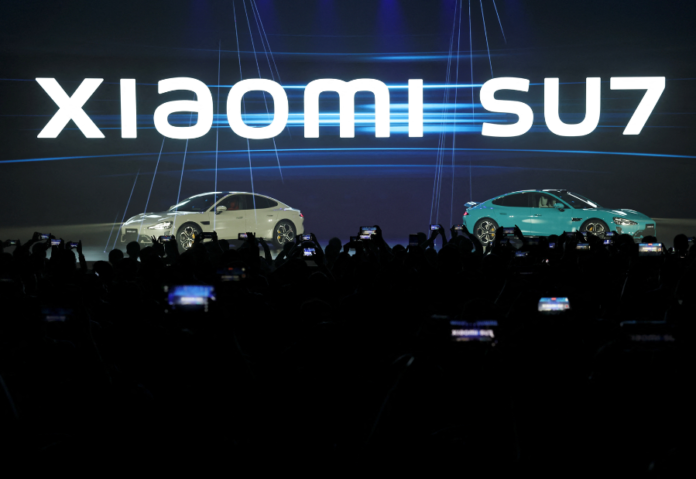The CEO of Xiaomi boasted that “super electric motor” technology will be featured in the much anticipated car known as the SU7.
Chinese smartphone manufacturer Xiaomi (1810.HK) declared its goal to rank among the top five automakers globally after unveiling the first electric vehicle on Thursday.
Chief Executive Lei Jun bragged that the highly awaited sedan, called the SU7 (SU short for Speed Ultra), will have “super electric motor” technology that could accelerate vehicles faster than Porsche’s EVs and Tesla (TSLA.O) vehicles.
The automobile, which is expected to be on sale in a few months, is making its debut at a time when the world’s largest auto market, China’s, is struggling with a supply glut and sluggish demand, which has fueled a brutal price war.
Lei Jun, the CEO of Xiaomi, continued to outline ambitious goals in spite of this.
“By working hard over the next 15 to 20 years, we will become one of the world’s top 5 automakers, striving to lift China’s overall automobile industry,” he stated.
One of those goals is to create “a dream car comparable to Porsche and Tesla,” he continued.
Because the SU7 runs the same operating system as Xiaomi’s well-known phones and other electronics, it should also be appealing to consumers. Its drivers will be able to easily access the company’s current mobile app library.
According to Bill Russo, CEO of Shanghai-based advising business Automobility, “Xiaomi is a well-established consumer electronics brand with hundreds of millions of ‘Mi Fans,’ or members of its smart device ecosystem.”‘
“As such, they have a significant opportunity to break through as the automobile becomes a smart device.”
There will be two variants of the SU7: one with a driving range of up to 800 km and another with a range of up to 668 km (415 miles) on a single charge. In contrast, the maximum range of Tesla’s Model S is 650 kilometers.
The cost has not yet been disclosed. The price would “in fact be a bit high, but one that will have everyone thinking is justified,” according to Lei.
Amid one of China’s coldest Decembers ever, the SU7 was also positioned to appeal to winter-weary buyers. Lei claimed that it could quickly charge in cold weather and that its cutting-edge technology enabled it to identify barriers in difficult situations like snowfall.
He added that Xiaomi vehicles would lead the industry in autonomous driving skills.
However, Lei’s aspirations were unsuccessful in raising Xiaomi’s stock price, as the Hong Kong-listed company’s shares gave up previous gains to close 0.3% down.
In response to the stalling smartphone market, China’s fifth-largest smartphone manufacturer has been attempting to expand into the EV market. The company initially announced this strategy in 2021. Other Chinese tech giants, like search engine Baidu (9888.HK) and telecom behemoth Huawei (HWT.UL), have teamed up with manufacturers to create EVs.
One of the few new companies in China’s EV sector to receive approval from regulators who have been hesitant to contribute to the glut of supply is Xiaomi, which has promised to invest $10 billion in cars over the course of ten years.
A division of the state-owned automaker BAIC Group (1958.HK) will make its automobiles at a factory in Beijing that can create 200,000 of them annually.
BYD (002594.SZ), which holds a one-third share while Tesla has 9%, is expected to be Tesla’s largest rival in the fiercely competitive Chinese EV industry, according to third-quarter data from Zheshang Securities.
Do Follow: CIO News LinkedIn Account | CIO News Facebook | CIO News Youtube | CIO News Twitter
About us:
CIO News, a proprietary of Mercadeo, produces award-winning content and resources for IT leaders across any industry through print articles and recorded video interviews on topics in the technology sector such as Digital Transformation, Artificial Intelligence (AI), Machine Learning (ML), Cloud, Robotics, Cyber-security, Data, Analytics, SOC, SASE, among other technology topics.






